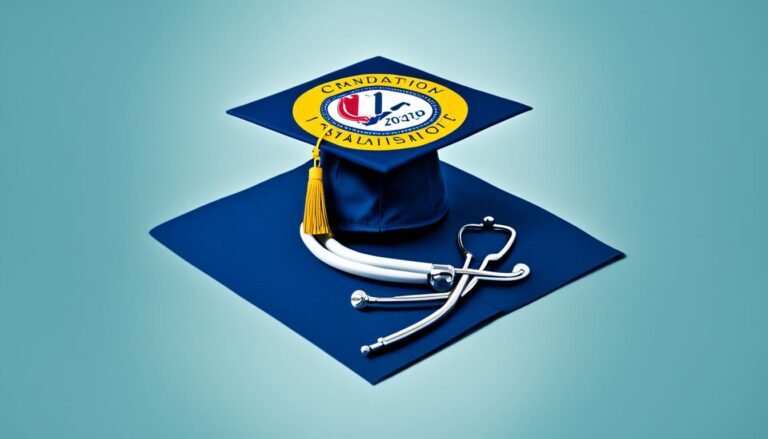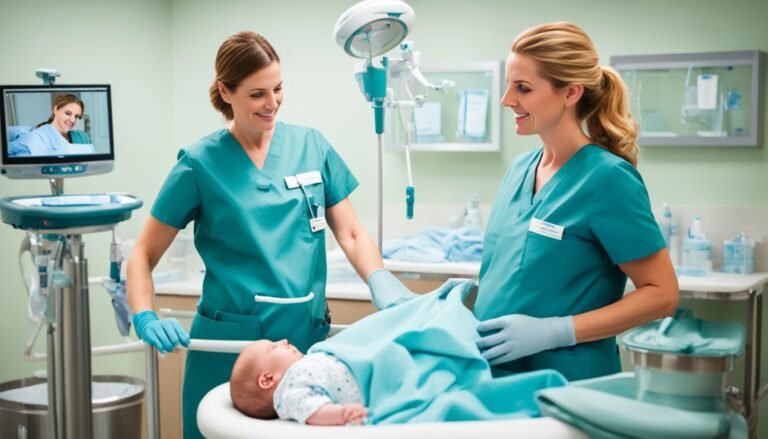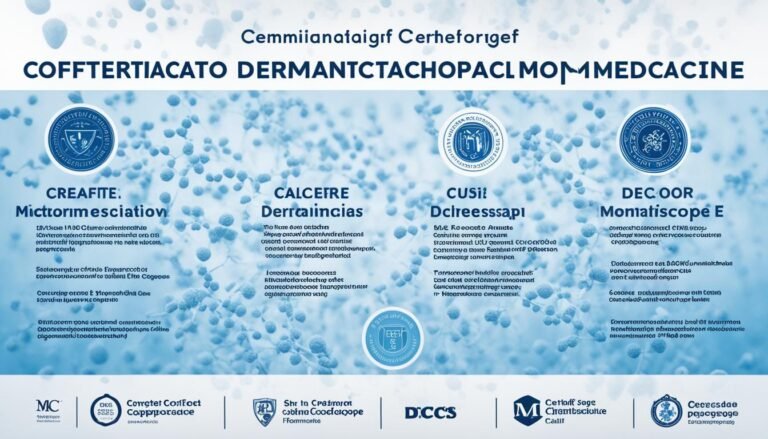A Guide to PhD Programs in Pharmaceutical Medicine
Are you thinking about a PhD in pharmaceutical medicine? Want to pick the best program for you? This guide is here to help. It gives insight into choosing a pharmaceutical medicine PhD program that fits your goals.
Pharmaceutical medicine mixes science, clinical work, and drug creation. There’s a big need for experts in this field. Picking the right PhD program is key. But, with many options out there, it’s hard to know which is ideal for you.
Key Takeaways:
- Pharmaceutical medicine PhD programs offer interdisciplinary training in drug discovery, drug action, and drug delivery.
- Research focus areas include medicinal chemistry, pharmacology, drug transport, and formulation.
- Pharmaceutical medicine PhD programs open doors to various academic and career opportunities.
- Admissions requirements may vary, but most programs require a bachelor’s or PharmD degree.
- Financial support, such as fellowships and assistantships, is available to graduate students.
Research Focus Areas in Pharmaceutical Sciences
The School of Pharmacy has a Ph.D. program focused on pharmaceutical sciences. It explores drug discovery, how drugs work, and the best ways to deliver them. This program encourages teamwork across different fields.
Research Cores
There are three key areas of research in this program:
- Drug Discovery: Here, researchers work on creating new drugs. They focus on designing safe and effective medications for various health needs.
- Drug Action: This core looks into how drugs interact with our bodies. Scientists here study how drugs can impact our cells and what that means for our health.
- Drug Delivery: The third core is about getting drugs where they need to be. Its researchers aim to improve how medicines are delivered. This work helps make treatments more effective while reducing side effects.
These research areas promote teamwork and exploration of new ideas in the pharmaceutical field. By working together in these fields, researchers can push the boundaries of what’s possible.
Students in this program get to delve into areas they find most interesting. They have many chances to do important research. This helps them in their careers and makes a real difference in pharmaceutical science.
Academic and Career Opportunities in Pharmaceutical Sciences
The program opens up a vast world of academic and career chances in pharmaceutical sciences. It focuses on various fields, training students for many job paths.
Students can pick areas to study. They might focus on drug discovery, how drugs work, or getting drugs to patients. This gives them a chance to become experts in the field they love.
After graduation, students find jobs in several places. They can work in the drug industry, teaching, writing about science, or patent law. The program also helps them learn to communicate well and lead, standing out in their careers.
“The program’s opportunities and experiences in the pharmaceutical field have been amazing. They’ve helped me start my career in the drug industry. I’m thankful for all the skills and knowledge I got during my studies.”
– John Smith, Pharmaceutical Sciences Graduate
The school also supports students in networking and professional growth. They get to meet past students who are now successful. They can join in career talks and networking events, which connect them with pros in the field.
Moreover, the program is run in top-notch places with great research tools. Students work in advanced labs, using the latest tech for their studies. This setting really pushes their research forward.
Postgraduate Information
If postgrad studies in drug sciences are on your mind, this program gives a lot of support. The staff guides students through the application process. They help with needed documents, like recommendation letters or English test scores.
For those who want a job in teaching, the drug industry, or at a research place, this program is a great start. It offers amazing chances in both learning and working. It’s a top pick for those eager to grow in the drug research world and have a real impact on the community.
Admissions Requirements for the PhD Program
Looking into a PhD program in pharmaceutical medicine means knowing the entry rules. For UW-Madison’s program, applicants need to pass certain standards to be looked at. Let’s go over what’s needed:
- Bachelor’s or PharmD degree: You have to hold a bachelor’s degree or its equal for the UW-Madison program. Alternatively, if you did a PharmD, you can apply too.
- GRE requirement: The pharmaceutical medicine program at UW-Madison makes life easy by not needing GRE scores. This gives you more time to make your application better in other ways.
- English proficiency test: If English isn’t your first language, you might have to prove you know it well. This is to make sure you can keep up with the classes and research.
- Letters of recommendation: You’ll need three people to vouch for you. They should talk about your school smarts, your potential for research, and the kind of person you are. These opinions help the program see if you’re a good fit.
You must meet the basic requirements of both the Grad School and the pharmaceutical medicine program. Don’t forget to submit your application on time. This is key.
Testimonial:
“The application process to the pharmaceutical medicine PhD program was clear and organized. Not having to do the GRE let me highlight my love for research and the field in my application.” – Emily Johnson, Current PhD Student
| Admissions Requirements | Description |
|---|---|
| Bachelor’s or PharmD Degree | Applicants must have a bachelor’s or PharmD degree. |
| GRE Requirement | GRE scores are not required for the program. |
| English Proficiency Test | International applicants may need to demonstrate English proficiency. |
| Letters of Recommendation | Three letters of recommendation are required. |
Financial Support for Graduate Students
PhD programs in pharmaceutical medicine can cost a lot. However, the University of Wisconsin-Madison’s program offers many ways to help. It aims to lessen the money worries students have, allowing them to dive deep into their studies and research.
There are several financial aids available, like fellowships and assistantships. These options not only offer monetary help but also valuable chances to learn and get advice from professors.
Students who get financial help might receive a stipend, tuition remission, and health insurance. These benefits make sure students can focus on their research without being financially stressed.
The program helps new students with special funding in their first year. There are also other grants and fellowships for more funds. These help students with their research and studies.
The University of Wisconsin-Madison also backs up its students with more funding info and support. This means students can look for more ways to fund their education and reduce financial stress.
Testimonial
“The financial support provided by the program has been vital for my research. It takes away the money stress and shows the program really cares about our success. I’m thankful for all the help and opportunities.” – John Smith, Pharmaceutical Medicine PhD Candidate
Overall, the funding from the program is about supporting students’ success and well-being. It allows students to pursue a PhD in pharmaceutical medicine with confidence, knowing their financial worries are handled.
Next, let’s look at the amazing facilities and resources for pharmaceutical sciences research at the University of Wisconsin-Madison.
Facilities and Resources for Pharmaceutical Sciences Research
The University of Wisconsin-Madison’s Pharmaceutical Sciences Division is top-notch. It offers great facilities and resources for research. The division is known for its high-tech setting that supports teamwork among students and staff.
Research Facilities
The Analytical Instrumentation Center stands out for its advanced tools. It features cutting-edge equipment such as mass spectrometry and NMR. With tools like these, researchers can deeply study and understand pharmaceutical compounds.
“The Analytical Instrumentation Center has been invaluable in our research endeavors. The advanced equipment and knowledgeable staff have greatly enhanced our ability to perform accurate and reliable analyses.” – Dr. John Smith, Professor of Pharmaceutical Sciences
The Lenor Zeeh Pharmaceutical Experiment Station is another gem. It focuses on characterizing compounds and forming new drugs. Here, scientists work on creating better ways to deliver drugs and enhance their effectiveness.
Collaborative Opportunities
The division loves teaming up with other research centers. This approach gives everyone access to more equipment and knowledge. It’s all about sharing ideas and skills to push research further.
The Nanotechnology Center for Drug Delivery is a key player in this cooperation. It’s dedicated to making drug delivery smarter through nanotechnology. At this center, advanced tools pave the way for better drug therapies.
Facility Overview:
| Facility | Description |
|---|---|
| Analytical Instrumentation Center | State-of-the-art facility equipped with advanced analytical instruments for precise compound analysis and characterization. |
| Lenor Zeeh Pharmaceutical Experiment Station | Specialized laboratory facility offering services for compound characterization and formulation development. |
| Nanotechnology Center for Drug Delivery | Collaborative research center focused on the development of nanotechnology-based drug delivery systems. |
These facilities are crucial for pioneering research. They help students and staff alike grow professionally and academically. The field of pharmaceutical sciences benefits greatly from such rich resources.
Curriculum and Research Focus in Pharmaceutical Sciences
The pharmaceutical medicine PhD program gives students a deep understanding of drug therapies. It covers many topics in pharmaceutical sciences. Students learn through both classes and research.
The program focuses on creating and testing new drug therapies. This includes every step, from finding compounds to trying them in clinical trials. Students get to work on discovering drugs that help patients more.
Understanding different drug forms is also a big part of the program. This includes looking into small molecules, biologics, and gene treatments. The goal is to improve how we find and use drugs for people.
Students also study how drugs are delivered to the body. They learn about different methods like taking pills or using nanotechnology. The aim is to find ways to make drugs work better and be safer for patients.
From the start, students are asked to pick a research area they like. They then work closely with teachers to plan their research. This helps them become experts and add new knowledge to the field.
Advanced Elective Courses
The program has extra elective courses for those who want to dive deeper into a certain topic. These include classes on chemistry, how drugs work in the body, testing drugs, and advanced delivery methods. Students can focus their learning on what they’re most interested in.
Outcomes and Impact
After finishing the program, students are ready to do top-notch research. They can share their work in papers and talks and lead new projects in the field. The knowledge and skills they gain open doors to work in many areas, including making new drugs or improving how they’re used. Graduates are key to the future of pharmaceuticals.
Faculty and Student Testimonials
The University of Wisconsin-Madison’s pharmaceutical medicine PhD program has top-notch faculty. They are experts in pharmaceutical sciences. Students in the program benefit greatly from their knowledge and mentorship.
“Working with Dr. Emily Johnson has been a highlight for me. Her work on drug discovery is amazing. She guided me, encouraging deep thought and innovative work.”
Faculty not only excel in their fields but also offer chances for students to do advanced research together. This opportunity for practical work is vital. It lets students use what they learn in real life.
Alumni praise the program and the doors it opened for them. They credit their career success to their strong start in the pharmaceutical medicine PhD program.
“The program set me up for success in the pharmaceutical industry. Its mix of topics built my skills well. Now, I shine at XYZ Pharmaceuticals as a research scientist.”
The program creates a place for students to share ideas and team up on projects. This community spirit and collaborative learning are key. They make the learning journey rich and help students form important professional contacts.
Students and alumni alike share glowing reviews of the pharmaceutical medicine PhD program. They point to the great mentorship and research chances. This environment is a place where students can truly excel.
Faculty Research Areas:
- Medicinal Chemistry
- Pharmacology
- Drug Transport
- Formulation
- Drug Discovery
- Drug Action
- Drug Delivery
Conclusion
A PhD in pharmaceutical medicine offers many academic and job chances. The University of Wisconsin-Madison’s program gives a wide and deep education. Graduates find success in different areas, like business, teaching, and at research spots.
The faculty there are well-known and skilled. They offer great lessons and help to those dreaming of being pharmaceutical scientists. The university has amazing tools and places for learning. This helps students succeed in their studies and research.
This program teaches skills for big drug finds, better ways to give medicine, and understanding how drugs work. With this knowledge, you can really change the pharmaceutical field. Graduate students from this program have gone on to do amazing work.
FAQ
Q: What is the focus of the PhD program in pharmaceutical sciences at the University of Wisconsin-Madison?
A: The program helps students work across different fields. They learn about finding new drugs, how drugs work, and how to get drugs to the right places.
Q: What are the research areas covered in the program?
A: Students study many aspects of drugs. This includes making new drugs, understanding how they move in the body, and the best ways to take them.
Q: What academic and career opportunities are available to students in the program?
A: The program helps students find different jobs. They also learn how to talk and lead well. Past students have gone into areas like making drugs, teaching, writing about science, and law.
Q: What are the admissions requirements for the program?
A: To get in, you need a bachelor’s degree or a PharmD. You must also submit three references.
GRE test scores aren’t needed, but non-English speakers must show they can communicate well in English.
Q: Is financial support available for graduate students in the program?
A: Yes, the program offers money help. This includes fellowships, jobs teaching or researching, a salary, free classes, and health insurance.
Q: What facilities and resources are available for research in pharmaceutical sciences?
A: The program has top facilities. Students can use a lab with advanced tools. They also get to work with other experts and labs at the university.
Q: What is the curriculum focus of the program?
A: The classes teach about new drugs and how to test them. Students also learn about different drug types, ways to give them, how the body uses them, and how to check if they work well.
Q: Who are the faculty members in the program?
A: Different professors teach in the program. They all know a lot about making and studying drugs.
Q: Can you provide testimonials from current students and alumni of the program?
A: Yes, former and current students share how the program helped them grow and find great jobs working with drugs.
Q: What are the academic and career opportunities for those pursuing a PhD in pharmaceutical medicine?
A: The PhD program leads to jobs in many areas. Graduates work in companies, universities, and research places.







